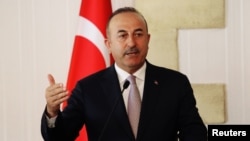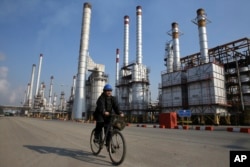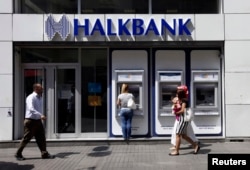Turkish Foreign Minister Mevlut Cavusoglu on Tuesday ruled out his country's compliance with U.S. sanctions on Iran, a move that threatens to exacerbate tensions between the NATO allies.
"We have told them we will not join these sanctions," said Cavusoglu, referring to a meeting last Friday with senior U.S. officials in Ankara. "While we are explaining why we will not obey these sanctions, we have also expressed that we do not find these U.S. sanctions appropriate."
Ankara strongly opposes U.S. President Donald Trump's decision to impose sanctions after pulling out of an international agreement with Iran on its nuclear energy program. Stringent sanctions are to start taking effect at the end of August, with measures against Iranian energy exports beginning in November.
Energy-hungry Turkey is heavily dependent on its Iranian neighbor for oil and natural gas, while Turkish businesses are eyeing Iran as an increasingly important market.
On Friday, Marshall Billingslea, assistant secretary of the Treasury for terrorist financing, visited Ankara to meet with Turkish officials and business representatives. Billingslea described the talks as "positive" and acknowledged the difficulties faced by Turkish companies, but warned, "The Treasury sanctions will be enforced very, very aggressively and very comprehensively."
Washington says no to any waivers for countries trading with Iran, which puts it on a collision course with Ankara.
"We've seen this in the past. Turkey will not comply with U.S. sanctions. It will not stop importing Iranian gas and oil," said Sinan Ulgen, head of the Istanbul-based Edam research institution. "Maybe the Turkish banks will be more careful because of what happened to Halkbank, but that's about it."
Earlier this year, a New York court convicted a senior executive of the Turkish state-controlled Halkbank for violations of previous U.S. sanctions on Iran. Analysts suggest the conviction will result in Turkish banks being reluctant to offer services to Turkish companies operating in the Islamic Republic. The Halkbank conviction also provides Washington powerful leverage over Ankara.
"The Halkbank case is still open. The Treasury still has to decide on what kind of fine to impose," said analyst Atilla Yesilada of GlobalSource Partners. "I hear it will receive some kind of fine, from $1 billion to $10 or 11 billion. I think what kind of opinion is formed about [Turkish President Recep Tayyip] Erdogan and whether he can be won back to the Western camp will affect the size of that fine."
Analysts warn that hefty fines by U.S. authorities could also hit other Turkish banks implicated in the Halkbank case.
Iran, Russia
Turkey's deepening relations with both Iran and Russia have strained ties with its Western allies. On Monday, the U.S. Congress delayed the delivery of F-35 jets to Turkey because of Ankara's plans to purchase S-400 Russian missiles.
Ankara maintains that it is committed to its strategic alliances with the West, claiming trade motivates ties with Tehran and Moscow along with the need to cooperate to resolve the Syrian civil war.
Ilnur Cevik, a senior adviser to Erdogan, penned a column Monday, citing growing concerns over Iran. Cevik accused Tehran of a lack of gratitude over Ankara's stance in breaking previous U.S.-Iranian sanctions.
"Turkish goodwill and friendship were not reciprocated by Tehran. As soon as the Iranians signed the nuclear deal with the West, they turned their backs on Ankara and started to hurt Turkish interests. Turkish companies were unable to win contracts in Iran," wrote Cevik in the Turkish Sabah newspaper.
Cevik also warned of the threat posed by Tehran. "There is also Iran displaying Persian expansionist policies throughout the Middle East," Cevik wrote.
Turkey and Iran historically are regional rivals. They back opposing sides in the Syrian war. Ankara is also privately voicing frustration over Tehran's lack of cooperation in fighting the Kurdish insurgent group, PKK.
The PKK has been waging a decades-long battle for autonomy in Turkey and has its headquarters in neighboring Iraq, close to the Iranian border. A senior Turkish official, speaking anonymously, acknowledged that an ongoing military operation to seize the PKK headquarters is undermined by Tehran's refusal to seal its border to prevent the rebels from escaping.
"Iran is definitely a regional competitor of Turkey, no doubt about that, whether it's PKK or in the case of many other points," said international relations professor Huseyin Bagci at Ankara's Middle East Technical University.
Bagci suggests Ankara could be more flexible toward Washington over Iranian sanctions if Washington changes its approach.
"America unconditionally expects from Turkey that Turkey follows the line on its sanctions. Turkey cannot do this. It is economic suicide. If Turkey would follow the America policy, America should contribute to the economic losses of Turkey," Bagci said.






